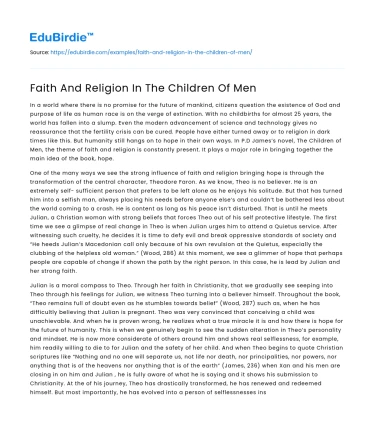In a world where there is no promise for the future of mankind, citizens question the existence of God and purpose of life as human race is on the verge of extinction. With no childbirths for almost 25 years, the world has fallen into a slump. Even the modern advancement of science and technology gives no reassurance that the fertility crisis can be cured. People have either turned away or to religion in dark times like this. But humanity still hangs on to hope in their own ways. In P.D James’s novel, The Children of Men, the theme of faith and religion is constantly present. It plays a major role in bringing together the main idea of the book, hope.
One of the many ways we see the strong influence of faith and religion bringing hope is through the transformation of the central character, Theodore Faron. As we know, Theo is no believer. He is an extremely self- sufficient person that prefers to be left alone as he enjoys his solitude. But that has turned him into a selfish man, always placing his needs before anyone else’s and couldn’t be bothered less about the world coming to a crash. He is content as long as his peace isn’t disturbed. That is until he meets Julian, a Christian woman with strong beliefs that forces Theo out of his self protective lifestyle. The first time we see a glimpse of real change in Theo is when Julian urges him to attend a Quietus service. After witnessing such cruelty, he decides it is time to defy evil and break oppressive standards of society and “He heeds Julian’s Macedonian call only because of his own revulsion at the Quietus, especially the clubbing of the helpless old woman.” (Wood, 286) At this moment, we see a glimmer of hope that perhaps people are capable of change if shown the path by the right person. In this case, he is lead by Julian and her strong faith.
Save your time!
We can take care of your essay
- Proper editing and formatting
- Free revision, title page, and bibliography
- Flexible prices and money-back guarantee
Julian is a moral compass to Theo. Through her faith in Christianity, that we gradually see seeping into Theo through his feelings for Julian, we witness Theo turning into a believer himself. Throughout the book, “Theo remains full of doubt even as he stumbles towards belief” (Wood, 287) such as, when he has difficultly believing that Julian is pregnant. Theo was very convinced that conceiving a child was unachievable. And when he is proven wrong, he realizes what a true miracle it is and how there is hope for the future of humanity. This is when we genuinely begin to see the sudden alteration in Theo’s personality and mindset. He is now more considerate of others around him and shows real selflessness, for example, him readily willing to die to for Julian and the safety of her child. And when Theo begins to quote Christian scriptures like “Nothing and no one will separate us, not life nor death, nor principalities, nor powers, nor anything that is of the heavens nor anything that is of the earth” (James, 236) when Xan and his men are closing in on him and Julian , he is fully aware of what he is saying and it shows his submission to Christianity. At the of his journey, Theo has drastically transformed, he has renewed and redeemed himself. But most importantly, he has evolved into a person of selflessnesses instead of selfishness through faith and hope.
A major event that contributes to the rise of hope is the birth of the very first child after almost 25 years. Julian’s child is seen almost as a messiah as “he will be hailed as a miracle” (James, 166) and be “the new Adam” (James, 166) which alludes to the bible as Adam was known to be the first man and the creator humanity itself. Referring the Julian’s child as Adam foreshadows that the child will go on to redeem humanity again.






 Stuck on your essay?
Stuck on your essay?

